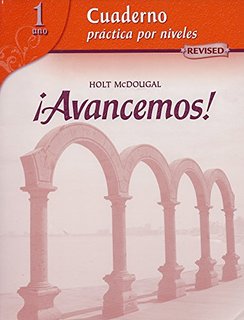
All Solutions
Page 348: Gramatica B
|Singular |Plural |
|–|–|
|Yo **me** |Nosotros **nos** |
|Tú **te** | Ustedes **se**|
|Él/Ella/Usted **se** |Ellos/Ellas **se** |
– Francisco y yo **nos despertamos**…
*(Francisco and I wake up at 6 AM.)*
*Francisco and I (we)* is first-person plural, so we used the first-person plural form of the verb and the pronoun.
– Los amigos de Francisco **se duchan**…
*(Francisco’s friends shower before they shave.)*
*Francisco’s friends (they)* is third-person plural, so we used the third-person plural form of the verb and the pronoun.
– Yo nunca **me afeito**…
*(I never shave after I shower.)*
*Yo (I)* is the first-person singular, so we used the first-person singular form of the verb and the pronoun.
– ¿Tú **te secas** el pelo…?
*(Do you dry your hair with a hair-dryer?)*
*Tú (you)* is second-person singular, so we used the second-person singular form of the verb and the pronoun.
– Todos los días, Francisco **se acuesta**…
*(Every day, Francisco goes to sleep at 10 PM.)*
*Francisco (he)* is third-person singular, so we used the third-person singular form of the verb and the pronoun.
1. B
2. A
3. D
4. B
5. A
Remember that with **reflexive verbs you conjugate both the verb and the pronoun.**
|Singular |Plural |
|–|–|
|Yo **me** |Nosotros **nos** |
|Tú **te** | Ustedes **se**|
|Él/Ella/Usted **se** |Ellos/Ellas **se** |
*(to wake up)*
– Francisco **se despierta**…
*(Francisco wakes up at 10 AM.)*
*Francisco (he)* is third-person singular, so we used the third-person singular form of the verb and the pronoun.
*(to shave)*
– Francisco y Norberto **se afeitan**…
*(Francisco and Norberto shave before they shower.)*
*Francisco and Norberto (they)* is third-person plural, so we used the third-person plural form of the verb and the pronoun.
*(to fry hair)*
– Norberto y yo **nos secamos** el pelo…
*(Norberto and I dry our hair before we dress.)*
*Norberto and I (we)* is first-person plural, so we used the first-person plural form of the verb and the pronoun.
*(to dress)*
– ¿Ustedes **se visten**…
*(Do you dress before breakfast?)*
*Ustedes (you)* is second-person plural. Second-person plural is treated like the third-person plural, so they have the same verb and pronoun endings.
*(to fall sleep/to go to sleep)*
– Yo **me duermo**…
*(I fall asleep/go to sleep at midnight.)*
*Yo (I)* is the first-person singular, so we used the first-person singular form of the verb and the pronoun.
You should write about the sleeping and waking-up habits of the people you know and of your own. Use the model answers below as a reference.
Remember that with **reflexive verbs you conjugate both the verb and the pronoun.**
|Singular |Plural |
|–|–|
|Yo **me** |Nosotros **nos** |
|Tú **te** | Ustedes **se**|
|Él/Ella/Usted **se** |Ellos/Ellas **se** |
– Mis amigos **se despiertan** a las nueve en la mañana y **se acuestan** a medianoche.
*(My friends wake up at 9 in the morning and go to sleep at midnight.)*
*My friends (they)* is third-person plural, so we used the third-person plural form of the verb and the pronoun.
– Mi mamá **se despierta** a las siete en la mañana y **se acuesta** a las diez en la noche.
*(My mom wakes up at 7 in the morning and goes to sleep at 10 at night.)*
*My mom (she)* is third-person singular, so we used the third-person singular form of the verb and the pronoun.
– Yo **me despierto** a las ocho en la mañana y **me acuesto** a las once en la noche.
*(I wake up at 8 in the morning and go to sleep at 11 at night.)*
*Yo (I)* is the first-person singular, so we used the first-person singular form of the verb and the pronoun.

